Burnley unemployment benefit claims still well above pre-pandemic levels


Anti-poverty charity the Joseph Rowntree Foundation says the Government must act quickly to stop a wave of unemployment across the UK, including by extending increased help for benefits claimants.
Office for National Statistics data shows 4,845 people were claiming out-of-work benefits in Burnley as of September 10th, compared to just 2,910 in early March.
That’s 9.1% of the working-age population, up from 5.4%.
Advertisement
Hide AdAdvertisement
Hide AdThe figures include those aged 16 to 64 on Jobseeker’s Allowance and some Universal Credit claimants, who are unemployed and seeking work or employed but with low earnings.
The number getting help in Burnley also went up compared to the start of August, when there were 4,825 claimants.
A similar pattern was seen across the UK, where the claimant count more than doubled to 2.7 million in September compared to March. This was also a small rise (1%) from the previous month.
The national figures were adjusted to account for seasonal changes, which allows a better comparison between different months of the year.
Advertisement
Hide AdAdvertisement
Hide AdThe ONS cautioned that changes to Universal Credit in response to the virus mean more people could get the benefits while still being employed, which could affect the figures.
Separate ONS data shows UK unemployment rose by 138,000 to 1.52 million in the three months to August compared to the previous quarter – the highest since the start of 2017.
This saw the rate of unemployment jump to 4.5%, from 4.1% in the previous three months. To be counted as unemployed, workers need to be actively looking for a new job.
Redundancies also rose by a record 114,000 quarter-on-quarter to 227,000.
Advertisement
Hide AdAdvertisement
Hide AdRebecca McDonald, senior economist at the Joseph Rowntree Foundation, said the figures were "a stark reminder that this crisis still has a long way to run".
She added: "This is not the time for half measures. The Government can still act quickly and decisively to prevent a wave of unemployment that will hit the poorest hardest."
Ms McDonald said the £20 per week increase to Universal Credit – introduced in April – should be made permanent.
Chancellor Rishi Sunak recently announced that the new Job Support Scheme would be expanded to businesses required to shut down due to coronavirus restrictions, with two-thirds of employees' wages covered by the Treasury.
Advertisement
Hide AdAdvertisement
Hide AdBut in areas where lockdowns do not apply, employers will have to pay for time worked by their employees, which must be at least 33% of their usual hours. Business owners and the Government will share the cost of paying for some of the time not worked, giving employees 77% of their normal wage.
Both plans will replace the furlough scheme from October 31.
Ms McDonald said the new support for areas not in lockdown "will do little to protect the jobs of the lowest paid".
Mr Sunak said: “I’ve been honest with people from the start that we would unfortunately not be able to save every job. But these aren’t just statistics, they are people’s lives.
Advertisement
Hide AdAdvertisement
Hide Ad“That’s why trying to protect as many jobs as possible and helping those who lose their job back into employment, is my absolute priority.
“This is why we put together an unprecedented £190 billion package of support and have a comprehensive Plan for Jobs.”